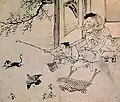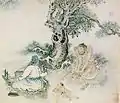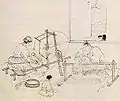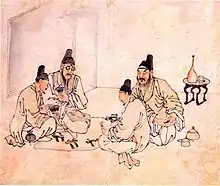| Kim Deuk-sin | |
| Hangul | 김득신 |
|---|---|
| Hanja | 金得臣 |
| Revised Romanization | Gim Deuk-sin |
| McCune–Reischauer | Kim Tŭk-sin |
| Art name | |
| Hangul | 긍재 or 홍월헌 |
| Hanja | 兢齋 or 弘月軒 |
| Revised Romanization | Geungjae or Hongwolheon |
| McCune–Reischauer | Kŭngjae or Hongwŏrhŏn |
| Courtesy name | |
| Hangul | 현보 |
| Hanja | 賢輔 |
| Revised Romanization | Hyeonbo |
| McCune–Reischauer | Hyŏnbo |
Kim Deuk-sin (1754–1822) was the son of a royal court painter, Kim Eungri, and followed in his father's footsteps. He entered royal service as a member of the Dohwaseo, the official painters of the Joseon court.[1] Kim Deuk-sin is known for his pungsokhwa along with Danwon.
Gallery
 Pajeokdo (파적도 破寂圖), literally "breaking serenity"
Pajeokdo (파적도 破寂圖), literally "breaking serenity" Bansangdo (반상도班常圖), literally yangban and commoners
Bansangdo (반상도班常圖), literally yangban and commoners A smithy (대장간)
A smithy (대장간) A family under the tree (수하일가도 樹下一家圖)
A family under the tree (수하일가도 樹下一家圖) Weaving a straw mat 자리짜기
Weaving a straw mat 자리짜기 Gambling (투전도 鬪錢圖)
Gambling (투전도 鬪錢圖) Returning from a market (귀시도 歸市圖)
Returning from a market (귀시도 歸市圖) Weaving a mat in the sweltering summer", 성하직구 (盛夏織구)
Weaving a mat in the sweltering summer", 성하직구 (盛夏織구)
See also
References
- ↑ Tourism, Korean Culture and Information Service Ministry of Culture, Sports and (2011-08-25). Korean Beauty. 길잡이미디어. p. 265. ISBN 978-89-7375-120-4.
{{cite book}}: CS1 maint: multiple names: authors list (link)
External links
Wikimedia Commons has media related to Kim Deuk-sin.
This article is issued from Wikipedia. The text is licensed under Creative Commons - Attribution - Sharealike. Additional terms may apply for the media files.